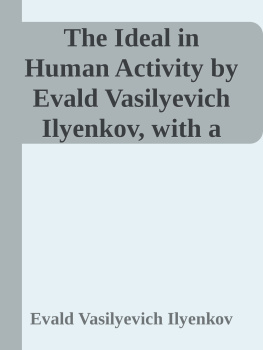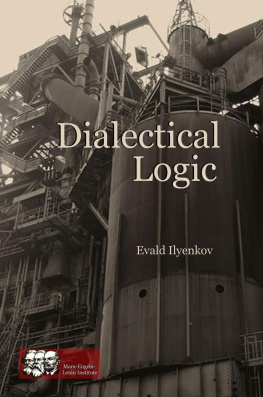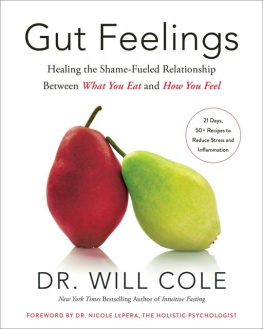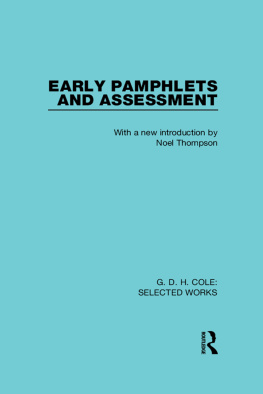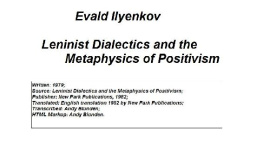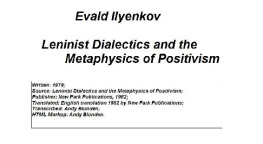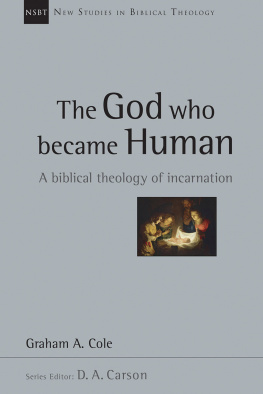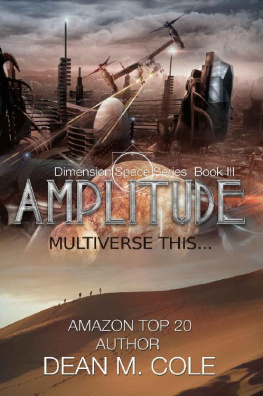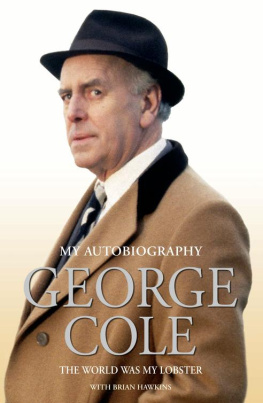Evald Vasilyevich Ilyenkov - The Ideal in Human Activity by Evald Vasilyevich Ilyenkov, with a preface by Mike Cole
Here you can read online Evald Vasilyevich Ilyenkov - The Ideal in Human Activity by Evald Vasilyevich Ilyenkov, with a preface by Mike Cole full text of the book (entire story) in english for free. Download pdf and epub, get meaning, cover and reviews about this ebook. genre: Science. Description of the work, (preface) as well as reviews are available. Best literature library LitArk.com created for fans of good reading and offers a wide selection of genres:
Romance novel
Science fiction
Adventure
Detective
Science
History
Home and family
Prose
Art
Politics
Computer
Non-fiction
Religion
Business
Children
Humor
Choose a favorite category and find really read worthwhile books. Enjoy immersion in the world of imagination, feel the emotions of the characters or learn something new for yourself, make an fascinating discovery.
- Book:The Ideal in Human Activity by Evald Vasilyevich Ilyenkov, with a preface by Mike Cole
- Author:
- Genre:
- Rating:5 / 5
- Favourites:Add to favourites
- Your mark:
- 100
- 1
- 2
- 3
- 4
- 5
The Ideal in Human Activity by Evald Vasilyevich Ilyenkov, with a preface by Mike Cole: summary, description and annotation
We offer to read an annotation, description, summary or preface (depends on what the author of the book "The Ideal in Human Activity by Evald Vasilyevich Ilyenkov, with a preface by Mike Cole" wrote himself). If you haven't found the necessary information about the book — write in the comments, we will try to find it.
Evald Vasilyevich Ilyenkov: author's other books
Who wrote The Ideal in Human Activity by Evald Vasilyevich Ilyenkov, with a preface by Mike Cole? Find out the surname, the name of the author of the book and a list of all author's works by series.
The Ideal in Human Activity by Evald Vasilyevich Ilyenkov, with a preface by Mike Cole — read online for free the complete book (whole text) full work
Below is the text of the book, divided by pages. System saving the place of the last page read, allows you to conveniently read the book "The Ideal in Human Activity by Evald Vasilyevich Ilyenkov, with a preface by Mike Cole" online for free, without having to search again every time where you left off. Put a bookmark, and you can go to the page where you finished reading at any time.
Font size:
Interval:
Bookmark:
with a preface by Mike Cole
Marxists Internet Archive
P.O. Box 1541; Pacifica, CA 94044; USA.
CC-SA (Creative Commons Attribution-Share Alike 3.0)
2009 by Marxists Internet Archive.
Cover design by Joan Levinson.
Distributed by Erythrs Press and Media LLC.
Evald Vasilyevich Ilyenkov (1924-1979)
1. Philosophy, 2. Activity Theory, 3. Dialectics, 4. Marxism.
ISBN 978-0-9805428-7-5
References to Marx and Engels in footnotes have been changed to provide the reference to MECW (Lawrence & Wishart, London, and International Publishers, New York, 1975-2005, 50 volumes), but the words given by the Progress Publishers translators in the text have been left as per their translation of Ilyenkovs source.
From the History of Dialectics
1.
2.
3.
4.
5.
6.
Certain Problems of the Marxist-Leninist Theory of Dialectics
7.
8.
9.
10.
11.
Essays on The Ideal and Human Activity
The essays in this volume provide insight into the work of Evald Ilyenkov, a Marxist philosopher who played an important part in the revival of Russian Marxist philosophy following the death of Stalin. He is best known for two lines of work. First he wrote about Marxs dialectical method known as the method of ascent form the abstract to concrete which, as David Bakhurst has pointed out, provided a subtle critique of empiricism at the same time that it served as a political critique of the positivism and scientism that was prevalent in Soviet political and intellectual culture during Ilyenkovs lifetime. It also served as a philosophical foundation for research into theoretically guided education made famous in the work of Vasilii Davydov and his followers.
In connection with this work, Ilyenkov was a staunch supporter of the work of a group of psychologists, who, following the inspiration of Vygotsky, sought to conduct basic research on the development of human psychological processes while at the same time providing an existence proof of the humanitarian ideal that with sufficient care and understanding, even children who suffered blind-deafness could become fully functioning members of society.
Ilyenkovs work is also important in helping us to think about the relationship of the material and the ideal in human life. He referred to this issue as the problem of the ideal by which he meant the place of the non-material in the natural world. Central to his solution of this age-old philosophical problem was his formulation of the concept of the artefact. Ordinarily when one thinks of an artefact, a material object comes to mind. Something manufactured by a human being. In anthropology, the study of artefacts is sometimes considered part of the study of material culture, which is somehow distinct from the study of human behaviour and knowledge. According to this artefact as object interpretation, it is easy to assimilate the concept of artefact into the category of tool, in which case, nothing much is to be gained.
According to Ilyenkovs views, trace their genealogy back to Hegel and Marx and can be found in the writings of philosophers such as Jon Dewey, an artefact is an aspect of the material world that has been modified over the history of its incorporation in goal directed human activities. By virtue of the changes wrought in the process of their creation and use, artefacts are simultaneously ideal and material. They are manufactured in the process of goal directed human actions. They are ideal in that their material form has been shaped by their participation in the interactions of which they were previously a part and which they mediate in the present.
David Bakhurst, in his influential book on Ilyenkov, puts the matter thusly:
Rather, in being created as an embodiment of purpose and incorporated into life activity in a certain way being manufactured for a reason and put into use the natural object acquires a significance. This significance is the ideal form of the object, a form that includes not a single atom of the tangible physical substance that possess it (Bakhurst, 1990, p. 182).
Bakhurst, D., Consciousness and revolution inSovietphilosophy: From the Bolsheviks to Evald Ilyenkov. Cambridge: Cambridge University Press, 1991
Mike Cole
February 2009
Written in 1960; first published by Progress Press in 1982, English translation by Sergei Kuzyakov.
The terms the abstract and the concrete are employed both in everyday speech and in the special literature rather ambiguously. Thus, one hears of concrete facts and concrete music, of abstract thinking and abstract painting, of concrete truth and abstract labour. This usage is in each case apparently justified by the existence of shades of meanings in these words, and it would be ridiculously pedantic to demand a complete unification of the usage.
However, things are different when we are dealing not merely with words or terms but with the content of scientific categories that have become historically linked with these terms. Definitions of the abstract and the concrete as categories of logic must be stable and unambiguous within the framework of this science, for they are instrumental in establishing the basic principles of scientific thought. Through these terms, dialectical logic expresses a number of its fundamental principles (there is no abstract truth. truth is always concrete, the thesis of ascending from the abstract to the concrete, and so on). Therefore the categories of the abstract and the concrete have quite a definite meaning in dialectical logic, which is intrinsically linked with the dialectico-materialist conception of the truth, the relation of thought to reality, the mode of theoretical reproduction of reality in thinking, and so on. As long as we deal with categories of dialectics connected with words, rather than with words themselves, any licence, lack of clarity or instability in their definition (let alone incorrectness) will necessarily lead to a distorted conception of the essence of the matter. For this reason it is necessary to free the categories of the abstract and the concrete from the connotations that have been associated with them throughout centuries in many works by tradition, from force of habit or simply because of an error, which has often interfered with correct interpretation of the propositions of dialectical logic.
The problem of the relationship of the abstract and the concrete in its general form is not posed or solved in formal logic, for it is a purely philosophical, epistemological question, quite outside its sphere of competence. However, when it is a matter of classifying concepts, namely, of dividing concepts into abstract and concrete, formal logic necessarily assumes a quite definite interpretation of the corresponding categories. This interpretation appears as the principle of division and may therefore be established analytically.
On this point, most authors of books on formal logic apparently give a rather unanimous support to a certain tradition, albeit with some reservations and amendments. According to this traditional view, concepts (or ideas) are divided into abstract and concrete in the following manner:
Concrete concepts are those that reflect really existing definite objects or classes of objects. Abstract concepts are those that reflect a property of objects mentally abstracted from the objects themselves. [N I Kondakov]
Font size:
Interval:
Bookmark:
Similar books «The Ideal in Human Activity by Evald Vasilyevich Ilyenkov, with a preface by Mike Cole»
Look at similar books to The Ideal in Human Activity by Evald Vasilyevich Ilyenkov, with a preface by Mike Cole. We have selected literature similar in name and meaning in the hope of providing readers with more options to find new, interesting, not yet read works.
Discussion, reviews of the book The Ideal in Human Activity by Evald Vasilyevich Ilyenkov, with a preface by Mike Cole and just readers' own opinions. Leave your comments, write what you think about the work, its meaning or the main characters. Specify what exactly you liked and what you didn't like, and why you think so.

